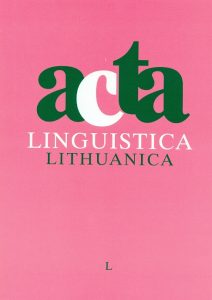Predikatinio daiktavardžio vartojimas: vardininkas vs. įnagininkas
The predicative use of nouns in Lithuanian: nominative vs. instrumental
Author(s): Loreta SemėnienėSubject(s): Language and Literature Studies
Published by: Lietuvių Kalbos Institutas
Keywords: Lithuanian; case variation; predicate nominals; nominative; instrumental
Summary/Abstract: In this article, the use of the nominative and the instrumental as predicative cases in Lithuanian copular sentences is duscussed. The emphasis is on cases where a morphosyntactic variation is observed. It is argued that, though the use of predicative cases may be influenced both by semantic and by formal factors, the relative importance of these factors in unequal in modern Lithuanian. Semantic factors (permanent vs. temporary property) have no decisive influence on the choice of one of these case forms. Both nominative and instrumental can be used to mark either a permanent or a temporary state (the instrumental being slightly higher in frequency with inanimates). The factors most markedly influencing the choice of case forms are: the inflectional form of the copula (tense and mood), finiteness vs. nonfiniteness, and word order. Various forms of markedness (marked tense and mood forms, marked word order) contribute to the use of the instrumental.
Journal: Acta Linguistica Lithuanica
- Issue Year: 2004
- Issue No: 50
- Page Range: 99-125
- Page Count: 26
- Language: Lithuanian

